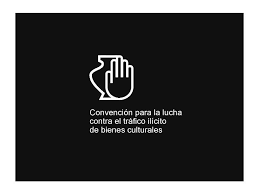Decolonization and Restitution of Cultural Artifacts: A Necessary Discussion
- ECP-FG Team

- 27. Juli 2020
- 4 Min. Lesezeit
One of the topics that has been discussed in the past years has to do with the restitution of cultural artifacts that were usurped during colonization and today are exhibited in museums in different countries. In this line, UNESCO, through the 1970 Convention, established a regulation to be adopted by the member countries. Although progress has been made in this area and there are successful cases, much remains to be done.
Cultural restitution refers to the process by which a "cultural property" that has been stolen, stripped or illegally appropriated is returned to its place of origin. These movable or immovable goods have an important cultural value in historical, archaeological, artistic, symbolic, religious, spiritual and other terms.
In 1970, as a result of the decolonization process, began to be discussed at the international level, the duty to return cultural artifacts that were being exhibited in museums or belonged to a private collection to their countries of origin.
In relation to this, UNESCO created the 1970 Convention, which establishes a series of measures to avoid, prohibit and prevent the illicit traffic of cultural property. This regulation obligates member countries to create laws that guarantee cultural restitution in their nations and also prevent this situation from occurring.
Today it may seem obvious that what belongs to a culture must be kept in that culture or country. However, if we start to research the history of cultural artifacts that are in the most important museums of the world, it is possible to realize that many of these were not donated, but rather looted or stolen in times of colonialism. Although much work remains to be done in this area, there are some successful cases where countries have worked together to return cultural artifacts to their place of origin.
In 2019, France returned to Peru three cultural objects looted from a pre-Columbian tomb. The objects were intercepted at the airport by French customs. In 2018, Switzerland returned 26 archaeological treasures to Egypt, objects dating from the third millennium BC to the fourth century BC. The pieces had been confiscated in the context of two criminal cases in the cantons of Lucerne and Valais. In the same year, Canada returned antiquities to Jordan, some of which date back to the third or fourth century A.D. and the Roman era. Also, in 2018, two ancient idols stolen from the country more than 30 years ago were returned, before appearing in the collection of the Metropolitan Museum of Art in New York. For more information on this, you can visit UNESCO.
A couple of days ago, an online conference called "Devuelve pe" was held to address the issue of restitution and self-determination of Latin American cultural heritage.
According to Arlette-Louise Ndakoze, from SAVVY Contemporary Gallery in Berlin,
"The restitution of material objects as immaterial, allows the recovery of identity. It is a break with the narrative issued during colonization, which presents some objects as if they belonged to a culture of the past, which no longer exists.

On the other hand, Tahir Della, from the organization Decolonize Mitte and No Humboldt 21, pointed out that the act of restitution questions the legality of the appropriation of cultural artifacts. "It is a concrete criticism of colonial domination, to return the objects is to abolish the traces of colonization (...) The process requires international collaboration because colonization was also global".
Another of the exhibitors was Manuela Fischer, from the National Museum of Berlin, Ethnological Museum of Berlin. According to Fischer, in this process it is important to develop an ethical relationship between the actors to allow for a historical revision between the colonizers and the colonized. The objective is to raise awareness of the colonial past WITH government support.
Elizabeth Salguero, former Bolivian ambassador, commented on her experience when she was a government representative in the recovery of the "Illa del Ekeko", a stone figure from the ancestral Pukara culture, which was successfully recovered after 156 years due to the demand for spiritual guides. This restitution was very important since this cultural artifact symbolizes the God of Abundance.
"The restitution of the heritage is part of the identity and even more, of the soul of the community. This heritage is the basis of the cultural transmission and memory of the people," added Elizabeth.

The restitution of cultural artifacts is a long process, which involves negotiation and exchange between various entities, both national and international. Despite this, it is a very important process that must be carried out for the peaceful development of relations between countries and the construction of the identity of many nations. In the restitution of a cultural asset, the country of origin is able to recover part of its history, memory and identity. At the same time, the country that made use of it illegally is able to raise awareness and repair the damage caused. It is an opportunity to generate links between countries, in order to promote and protect the legacy of a culture. The only way to understand the present is through the facts of the past, in an honest and responsible way.
The conference "Devuelve pe" concluded with profound reflections from the participants, where the importance of cultural restitution was pointed out, as a process that allows the reconciliation necessary to heal the relations between colonizers and colonized. Furthermore, this process must be supported by governments, where demands for the revaluation of property are heard and a constructive dialogue takes place to regain the dignity of cultures.





Kommentare